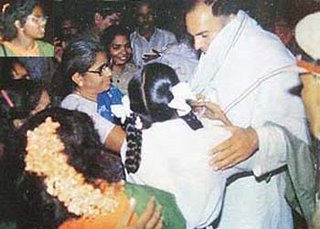New Delhi, Feb 19: Tamil Nadu Chief Minister J Jayalalithaa's decision for early release of Rajiv Gandhi's killers invited a sharp reaction from Congress, which termed it as "irresponsible, perverse and populist".
Slamming AIADMK government's decision, AICC spokesperson Abhishek Singhvi said, "Any perverse decision is also liable for judicial scrutiny" but remained evasive when asked whether Congress will ask Centre to approach court in this matter.
He insisted that there is a fundamental difference between commutation of a sentence and release or remission. The party has already made it clear that it has no issue with the Supreme Court order commuting the death sentence of Rajiv killers to life imprisonment.
"Every state has powers of remission but these are the powers, which are to be exercised by Constitutional functionaries" in the light of rules and regulations and the spirit of any judicial order.
"The nation cannot forget that it lost not only its Prime Minister but also 17 other Indian citizens including Tamils to terrorism. We condemn unequivocally such irresponsible statements and decisions by such Constitutional functionaries.
"... Such decisions announced in such casual fashion and cavalier manner need to be condemned irrespective of regional, populist and other considerations. This decision fails to take into account the scourge of terrorism and the spirit of Constitution," Singhvi said replying to questions.
Maintaining that the Supreme Court has not talked about release and remissions in its order, Singhvi said it simply followed an old order commuting death sentence of the accused to life imprisonment.
Tamil Nadu government today decided to set free within three days all the seven convicts in the Rajiv Gandhi assassination case after the Supreme Court commuted the death penalty of three assassins Santhan, Murugan, the husband of Nalini, and Perarivalan yesterday sparing them from gallows.
Criticising the decision, Singhvi said Jayalalithaa should remember that it was a constitutional head of the government once who was assassinated in this case.
He at the same time skirted queries as to what decision the Centre would take into the issue.
The Congress spokesperson stressed that what he was saying is the party view while people are entitled to have their personal views.
"The party's stand is clear before you, the nation, the government and Tamil Nadu... when the party through me, an official spokesperson says something from the official podium, it stands with it. Individual stands are individual personal opinions. They are not the party's stand," he said.
Union minister Rajeev Shukla said that the decision taken by the Tamil Nadu government is "highly deplorable" and wondered why there was so much hurry in it.
"The issue involved a Prime Minister and therefore the Tamil Nadu government should have thought twice over the matter," he said.
Jayalalithaa, who took the decision for early release of the Rajiv killers at an emergency Cabinet meeting convened this morning over the issue, made a suo motu announcement in the state assembly.
She said in compliance with the Sec 435 of Cr. Pc., the state would send the Cabinet decision to the Centre seeking its nod for the release as the CBI filed the case against the convicts.
"If there is no reply within three days from the Centre, the state government will release all the seven under CrPc section 432 in accordance with the powers vested with it," she declared.
Majority of political parties in the state had demanded immediate release of convicts in the backdrop of Supreme Court observation that the state can consider their release.
DMK chief M Karunanidhi also lauded his arch political rival Jayalalithaa for her decision.





Comments
Add new comment